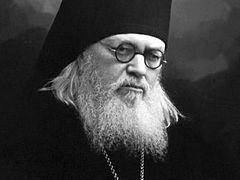OrthoChristian.com is posting this explanation of the Prayer of St. Ephraim the Syrian, repeated many times at every Lenten service, as a series. Today the holy hierarch Luke (Voino-Yasenetsky) discusses the spirit of ambition and idle talk.
“O Lord and Master of My Life! The spirit of ambition give me not!” What is the spirit of ambition (love of power)? It is the desire to be always first, to have authority over others. It destroyed the archangel, the chief of all angels, making him satan and casting him down from heaven; it destroyed Korah, Dathan, and Abiram, who envied the glory of Moses when he led the people of Israel through the desert to the land of Canaan. Ambition motivated all the heretics, who wanted to install their own teachings in place of the teachings of the Church and become the leaders of the Church. There have also been writers with depraved thoughts, who have corrupted whole generations.
The Lord Jesus Christ condemned love of power—the passion of the scribes and Pharisees to be first, their desire to sit at the head of the table at feasts, to receive greetings appropriate for rulers of the people. The Lord said to His disciples and through them to us, If any man desire to be first, the same shall be last of all, and servant of all (Mk. 9:35). Love of power is against the spirit of the Gospel, against the spirit of humility. Nevertheless this passion has a grip on everyone, and there is no one who is not infected with it—even little children.
Everyone tries to attain a high position, thirsts for promotions, desires honor. Many parents raise their children to be ambitious, to have the passion for being first, and corrupt them this way.
Is it so hard to understand that top positions are for the few? Everyone can’t be first. Essentially this is the destiny of exclusive people, marked by God. An extraordinarily large number of people strive to occupy high positions in society, and are not beneath any means in order to attain this goal; they will use connections, curry favor, or become lackies only so that they can get their aim.
Very often the Lord punishes them; their wretched passion ends in failure. They become embittered, refuse to do any community work, retreat into family life and close themselves up in it. But love of power torments them even there, and they torment their family members. There is no peace in their souls.
This is why St. Ephraim the Syrian in his great prayer asks God to save him from the corrupting spirit of ambition so contradictory to humility.
We have all been shown the path to honor, an honor above all honors, with which no earthly achievements can compare. It is the path to the Kingdom of God, where we can become friends, children of God. We will achieve this goal only by striving to fulfill all the commandments of Christ.
We have to remember that the Lord can bring us out to the broad path when we do not seek it, when we do not aim for earthly glory. He often gives us this glory aside from our own strivings and will. True glory flees from those who chase after and thirst for it, and finds those who run from it.
Without thinking about authority over other people, we need to delve into how we can develop our abilities and talents given to us by God, to further the development of our abilities quietly, unknown to the world. And it can turn out the way it has turned out many times, that the Lord raises such a person up to an unreachable pinnacle of glory. Remember that the Lord knows how to indicate people, to distinguish human works done according to Christ’s commandments. If any man desire to be first, the same shall be last of all, and servant of all.
Pray with St. Ephraim the Syrian to be delivered from the serious vice of love of power!
Part 4. The ability to guard the lips.
“O Lord and Master of my life! The spirit of idle talking give me not!” St. Ephraim prays for this, the holy prophet David says in his psalm, Set, O Lord, a watch before my mouth, and a door of enclosure round about my lips (Ps. 140:3), and the Lord Jesus Christ Himself said that That every idle word that men shall speak, they shall give account thereof in the day of judgment (Mt. 12:36). How serious and difficult it is to give account of every such word. And could there be anything else that could be easier to regard than words?
Our ability to say words to a significant degree makes us like unto God Himself. God created the world with a word, and the word of God has enormous, mighty power. The human word is also powerful. With a word the prophet Elias raised the dead, closed the heavens, brought rain to the earth and stopped it.
What is the power contained in a word? A word lives; it lives a hundred, a thousand years. The words uttered by God’s great prophets, who lived many centuries before the birth of Christ, the holy apostles, and divine ascetics are still alive today. The teaching of God’s Church has lived for millennia. And if a word lives a thousand years, that means it is very important. A word that leaves our lips always produces an extraordinarily profound effect not only on those around us but even on people far away from us.
The grace-filled and wise words of the saints foster righteousness in the world, create eternal goodness, while evil, sinful words bring dishonor, hatred, and enormous harm to all mankind. Words live, they are carried off like radio waves into space and pour into people’s hearts and minds.
A word is a huge force that either unites or divides people. If people were deprived of words they would be like the animals, and human life would be undone. How great and profound is the meaning of the human word!
We have met no few people in our lives, particularly women, who gab unrestrainedly and endlessly, and their tongues know no fatigue. Everything they say is empty and of no use to anyone.
St. Ephraim the Syrian prayed to God to deliver him from idle talk. He was afraid of falling, so that his tongue would not destroy him, and these wretched chatterers have no fear. People often put up with them—might as well let them chatter. They think that they are being listened to with pleasure, but everyone in the depths of their hearts is tired of them. If the tongue wags and talks idly, then the thoughts roam aimlessly, not concentrating on anything profound, true, or important. The soul hungers, the person is obnoxious to others, and causes serious harm to his own self. Such is the meaning of idle talk. Wise people who live a spiritual life never talk idly. They always tend to be silent and concentrated.
How can we get away from the vice of idle talk, what can we do with our unrestrained tongue? We need to do what St. Ephraim the Syrian does: pray to God for deliverance from this vice, and the Lord Jesus Christ will grant what we ask. We need to avoid communication with idle talkers, and seek the company of a few wise people, who only open their lips to say something beneficial. We need to be extremely attentive to ourselves, to acquire the habit of watching what our tongue says, what it is occupied with, and get used to keeping a reign on it—not allow it to wag idly.
The more a person concentrates on the most important, the interior, the true, the more time he has to read the Gospel, the Holy Scripture, the works of the holy fathers, and especially fathom their wisdom and aversion to idle chatter.
It is a great thing to acquire power over the tongue! The holy apostle James in his epistle wrote, If any man offend not in word, the same is a perfect man, and able also to bridle the whole body (Jas. 3:2). This means that subjugating the tongue is the highest goal of spiritual life—to bridle everything bad, to which the flesh is drawn. Start with bridling the tongue, and if you achieve this goal, you will achieve perfection and bridle your whole body. And once you have bridled your whole body you will be pure and righteous before God.
May the Lord vouchsafe all of you this purity and righteousness, and may the prayer of St. Ephraim the Syrian always remind you of this.
To be continued.






Research shows
"Men talk far more than women - In a now-classic study, Barbara and Gene Eakins recorded seven university faculty meetings. They found that, with one exception, the men at the meeting spoke more often and, without exception, spoke longer. The longest comment by a woman at all seven gatherings was shorter than the shortest comment by a man. Susan Herring found a similar pattern in online discussions among linguists on professional topics: "